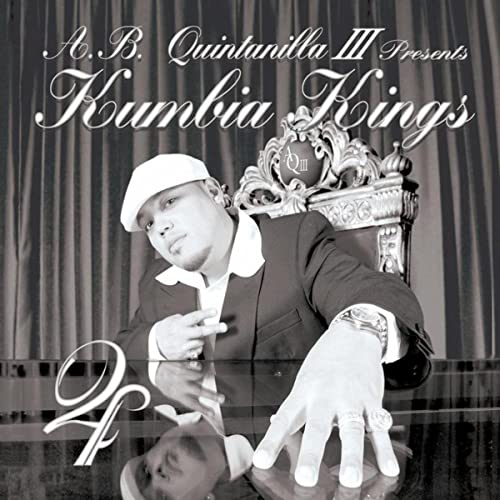 Kumbia Kings was a Mexican American band formed in 1999 by Abraham Isaac Quintanilla III and based in Corpus Christi, Texas. Quintanilla, the brother of Tejano singer Selena (1971–95), began his career performing with his sister and later became her producer. Kumbia Kings made music that attempted to reenergize interest in Tejano music, which had waned since Selena's death, and also to capitalize on the surge of interest in popular Latino music. The band specialized in Mexican cumbia, a style originally from Colombia that spread throughout Latin America in the mid-twentieth century. They combined this style with hip-hop, R&B, and Caribbean styles. Quintanilla left Kumbia Kings in 2006 and started the Kumbia All Starz (also known as A. B. Quintanilla's All Starz). After the All Starz disbanded in 2016, Quintanilla formed the band Elektro Kumbia.
 |
| Album cover for 4. |
"Mi Gente" was included on Kumbia Kings' album 4, which was released in 2003. 4 was conceived as a bilingual collaboration with various musicians, including the band Ozomatli, which is featured on "Mi Gente" (for more on Ozomatli, see "Violeta" and "(Who Discovered) America"). The lyrics are from the perspective of a mistreated migrant worker who calls for understanding and issues a plea for equal treatment. It resonates with the same cry for tolerance that characterizes the Jewish character Shylock in Act 3, Scene 1 of Shakespeare's The Merchant of Venice: "If you prick us, do we not bleed? If you tickle us, do we not laugh?" In the song, the migrant suffers, shouts, cries, and laughs, just as every human does. He appeals to listeners on behalf of his people ("mi gente") for social justice.
The lyrics' plea for equality is represented in the multicultural qualities of the music. The verses are largely typical of cumbia: percussion instruments and electric bass play a standard Mexican cumbia rhythmic pattern and horns and accordion respond to the vocals. Added to this texture, however, are scratched records, typical of hip-hop, cuica friction percussion from Brazil, and timbales, which are drums common in Cuban and other Caribbean musics. Moreover, the second bridge ("Sufro por ti para que no sigas así …") is in a Jamaican dancehall style, which leads to electric guitar solos and a more traditional trumpet solo. |


